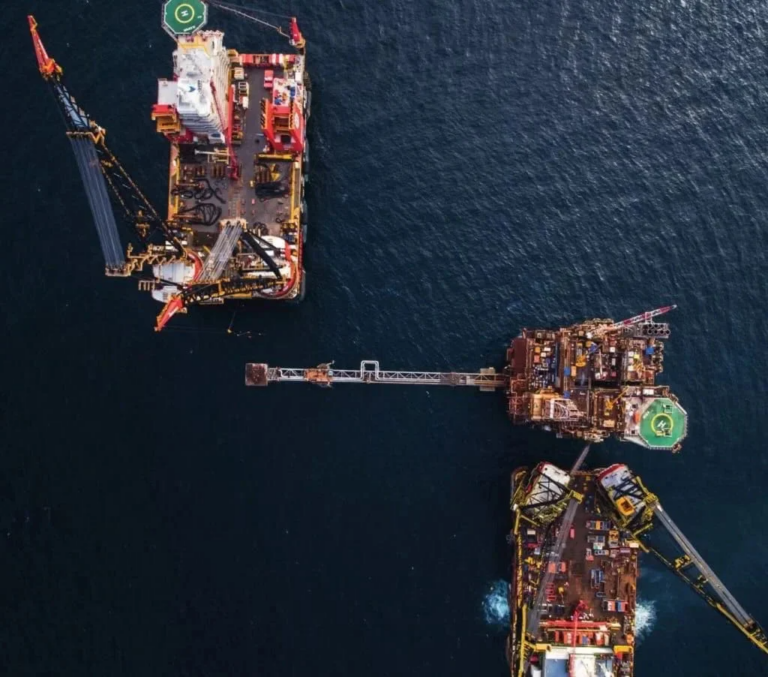Britain’s trade body for the offshore energy industry, Offshore Energies UK (OEUK), is convinced that the recent award of 31 new oil and gas licenses to operators will boost energy security and business confidence across all offshore energy sectors, as the expansion into wind, hydrogen, and carbon capture and storage (CCS) areas gains speed. However, additional investments are perceived to be needed to prevent the UK from becoming too reliant on energy imports.
 Illustration; Source: Offshore Energies UK (OEUK)
Illustration; Source: Offshore Energies UK (OEUK)
The 33rd licensing round attracted 115 bids in total from 76 companies across 257 blocks and part blocks, resulting in 82 offers to 50 companies. The licenses offered in the round are expected to add an estimated 600 million barrels of oil equivalent (MMboe) up to 2060, or 545 by 2050.
The UK’s 33rd oil and gas licensing round was opened on October 7, 2022, offering acreage across the North Sea, including four priority areas with known hydrocarbons. The first batch of 27 awards was handed out in October 2023, followed by a second batch of 24 licenses in February 2024.
The North Sea Transition Authority’s (NSTA) latest and third tranche of licenses, which came with 31 new license offers, is made up of 88 /part blocks in the Central North Sea, East Irish Sea, and the Southern North Sea.
David Whitehouse, Offshore Energies UK’s CEO, commented: “New oil and gas licenses benefit every sector in the UK. They will help to bring secure supplies of homegrown gas into our grid, reducing our reliance on more carbon intensive imports from overseas. These licenses will help to protect jobs and power and heat the nation’s firms and homes as we build the next generation of low carbon infrastructure here in the UK.”
According to OEUK, the licenses mainly concern gas extraction from the southern North Sea, with the potential to come onstream to power and heat the UK’s businesses and homes within the next five years. They are believed to have the capacity to make the UK less reliant on imported gas, which the NSTA considers more carbon-intensive. Therefore, the licenses could help lower the country’s carbon footprint as the industry seeks to create an attractive investment environment to enable a homegrown energy transition and boost economic growth.
In light of the above, the trade body recently urged policymakers to introduce policies allowing the UK to use the possibilities offered by the domestic offshore energy market, which has the potential to grow to £450 billion (close to $567.6 billion) by 2040. This would also protect jobs and energy security, and deliver cleaner and more affordable energy for Britain, OEUK explained.
“In this general election year, we face a choice: we can build a homegrown energy transition and kickstart economic growth by backing our people, our offshore firms and our world class supply chain, or we can import even more energy and fail to grow our new wind, hydrogen and carbon capture industries. Our energy security, economic growth, and thousands of jobs in almost every parliamentary constituency up and down the UK are at stake,” added Whitehouse.
State of play in Britain’s oil and gas sector
There are over 280 active oil and gas fields in the North Sea, however, approximately 180 of those are expected to stop producing by 2030 due to natural decline, thus the industry needs new licenses to ensure no cliff edge in domestic production. OEUK has warned that the UK will rely on oil and gas imports for 80% of its needs by 2030 if no new investments are made.
This is particularly relevant as the ‘OEUK Economic Report 2023‘ indicates that approximately 75% of the UK’s total energy comes from oil and gas, with around half of UK gas coming from the North Sea. Furthermore, produced oil is said to play an important role in meeting not only the energy security in Britain but also in Europe, where over 70% of the UK’s oil is used.
Whitehouse concluded: “We all recognise that our energy mix must change, and our sector is ramping up renewables and accelerating the drive to net zero. But this journey will take time. Meanwhile our North Sea basin is naturally declining. We have over 280 oil and gas fields but by the end of the decade 180 of them will have stopped producing. We need the churn of licenses for an orderly transition that supports jobs and communities across the country and meets our energy needs.”
Data from the ‘2022 NSTA Oil and Gas Reserves and Resources’ report shows that only 3% of production in the UK was replaced with new reserves in 2022. In other words, an investment in only one new barrel was made for every 33 existing barrels produced. OEUK believes 20 fields should have stopped producing last year, while only two would have started producing. Moreover, for every oil and gas well drilled around three are closed.
New license awards and prospects for the future
The NSTA’s analysis from July showed that domestic gas production results in around one-quarter less carbon footprint than importing liquified natural gas. As the UK is a rapidly declining producer of oil and gas, new licenses reduce the rate of declining UK supplies instead of increasing it above current levels.
OEUK believes the UK can remain on track to meet net zero by 2050 thanks to new licenses. Additionally, the NSTA is convinced that the North Sea basin has a key role in helping the country reach its net zero goals.
One of the companies that was offered a license in the latest tranche is UK-headquartered Orcadian Energy. The NSTA has indicated that the UK player will be offered a further license in the Southern North Sea, in addition to the two Central North Sea licenses from January 31, 2024. The Southern North Sea license, covering blocks 49/25b, 50/21a, 49/30a, and 50/26, contains a discovery with a high inert content, Earlham, and an undrilled prospect called Clover.
Steve Brown, Orcadian’s CEO, remarked: “Following on from the very large viscous oil accumulation at Fynn, and the shallow gas prospects on the Mid North Sea High, we are delighted to have completed a hat-trick of license awards with the SNS offer from the NSTA. The star of this license is the Earlham discovery which we believe can be developed as a gas-to-wire scheme with integrated carbon capture.
“Such an approach means the project could reliably supply electricity to the UK grid with near-zero emissions. This is a project that anyone who is concerned with energy security, grid reliability, consumer bills, and emissions can get behind, and which demonstrates how our industry can adapt to a net zero world.
“In addition, there is also a cracking Bunter sand prospect which was cleaved in two by the Department of Trade and Industry in 1971, when they put a block boundary right down the middle of the Clover prospect. This is the first time in over fifty years that a single license group has the whole prospect in hand which will enhance any potential farm-out opportunities for the license in the future.”
Orcadian recently sold the majority of its interest in license P2244 to Ping Petroleum UK. The license contains the Pilot development project, considered one of the largest undeveloped discoveries in the Central North Sea, with significant upside potential in the surrounding area.
Additionally, the AIM-listed Deltic Energy was provisionally awarded two licenses over eight blocks and part blocks. As reported by Deltic, all blocks are being provisionally awarded on a 100% equity position and contain a mixture of small discoveries and low-risk, infrastructure-led exploration prospects in the Southern North Sea gas basin. The firm will consider whether accepting further licenses in the UK is in the best interest of the business and its shareholders due to financial and political considerations.
Graham Swindells, CEO of Deltic, noted: “These further tranche 3 provisional awards further demonstrate the ability of the Deltic team to identify and acquire valuable exploration and appraisal acreage within the UKCS. We will now assess each of the provisional awards and carefully consider which, if any, of these awards the company will accept.”
This comes on the heels of the AIM-listed player’s recent announcement that it was struggling to find a farm-out partner to cover the appraisal costs of the Pensacola gas prospect, operated by Shell, partly due to financial uncertainty caused by the government’s windfall tax.





